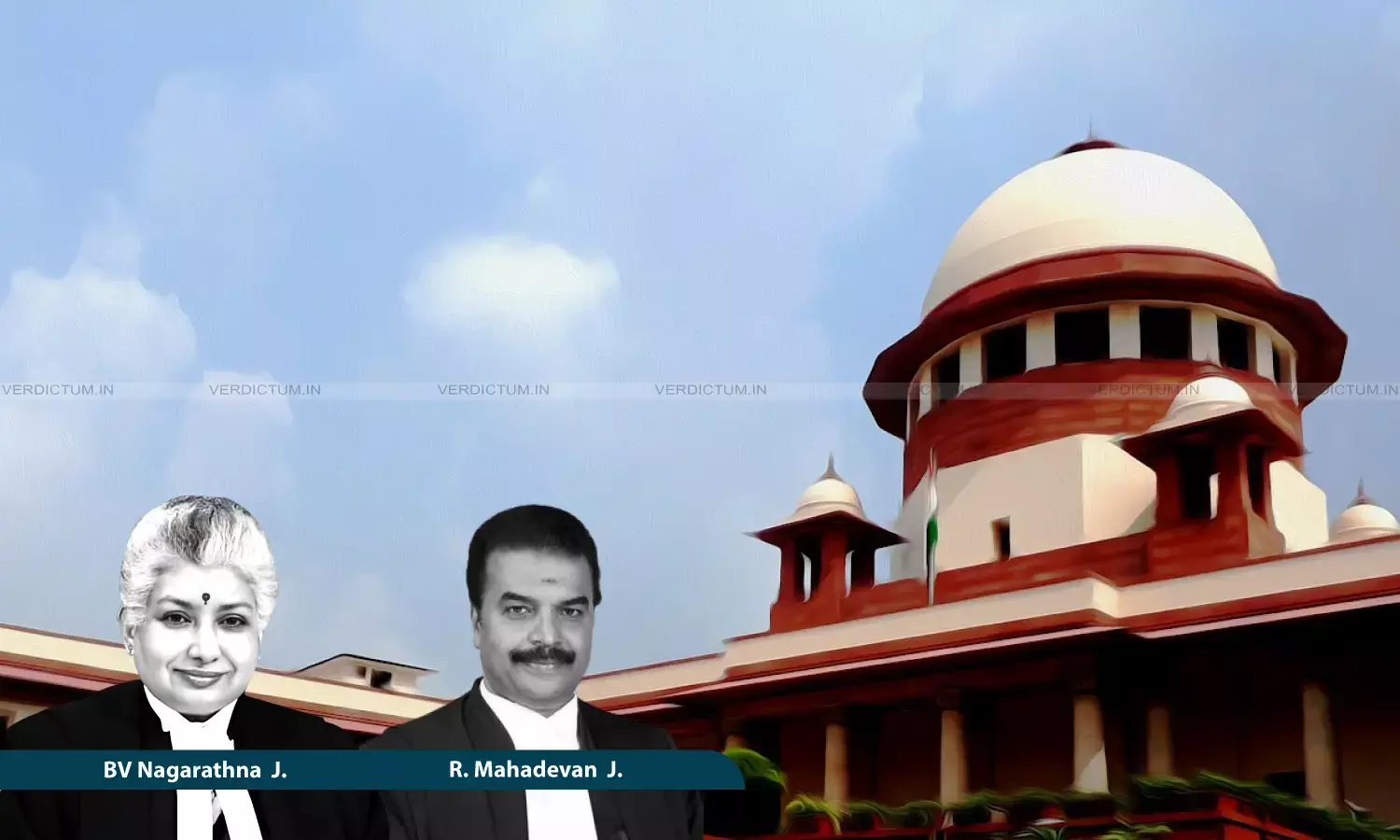Criminal Law Not Platform For Initiation Of Vindictive Proceedings To Settle Personal Scores & Vendettas: Supreme Court Quashes Cheating Case
The appeal before the Supreme Court arose from an order of the Himachal Pradesh High Court dismissing the application filed under Section 482 of the CrPC.

Justice B.V. Nagarathna, Justice R. Mahadevan, Supreme Court
The Supreme Court has quashed an FIR registered against 2 men under Section 420 read with Section 120B of the IPC after finding that the FIR was lodged after a delay of nearly five years and suspicion was raised upon the bona fides of the complainant. The Apex Court further held that criminal law must not become a platform for the initiation of vindictive proceedings to settle personal scores and vendettas.
The appeal before the Apex Court arose from an order of the Himachal Pradesh High Court dismissing the application filed under Section 482 of the Code of Criminal Procedure, 1973 (CrPC), preferred by the accused-appellant Paramjeet Singh. The Apex Court was also considering a Writ Petition preferred by the accused-petitioner, Sarabjit Singh, seeking quashing of the FIR wherein both Paramjeet Singh and Sarabjit Singh were arraigned as accused and charged under Section 420 read with Section 120B of the Indian Penal Code.
The Division Bench of Justice B.V. Nagarathna and Justice R. Mahadevan held, “The delay in lodging of the FIR, coupled with the vague allegations do not inspire the confidence of this Court to allow the criminal proceedings to continue against the appellants. The complainant had an alternative remedy of filing a civil suit claiming damages for the alleged violation of his contractual rights but a route through criminal proceedings, when no ingredient of offence is made out, cannot be permitted. Criminal law ought not become a platform for initiation of vindictive proceedings to settle personal scores and vendettas. The appellants, in our view, could not be attributed any mens rea and therefore, the allegations levelled by the prosecution against the appellants are unsustainable.”
AOR Himanshu Sharma represented the Appellant, while AOR Varinder Kumar Sharma represented the Respondent.
Factual Background
The appellants are brothers running business firms dealing in stone crushing. Appellant Paramjeet Singh has been running a proprietorship M/s Sardara Singh & Sons, and Petitioner Sarabjit Singh runs a proprietorship M/s Saini Engineering Works. In pursuance of a sale and purchase agreement, a cheque for an amount of Rs 5 lakh was drawn by M/s Soma Stone Crusher in favour of M/s Saini Engineering Works. Upon presentation of the said cheque for encashment, the same was returned by the bank with a remark: ‘Stop Payment’. Aggrieved by the same, M/s Saini Engineering Works, through Special Power of Attorney Paramjeet Singh (appellant herein), filed a complaint under Section 138 of the Negotiable Instruments Act, 1881, against M/s Soma Stone Crusher and the complainant.
After five years from the sale-purchase agreement, an FIR was lodged under Section 420 IPC at the instance of the complainant against the appellant. It was alleged that due to the delivery of a product with wrong specifications and failure to replace the same by the appellant, the complainant suffered a loss of Rs 50 lakh and hence was liable for the offence of breach of trust. Upon completion of the investigation with respect to the FIR, a final police report was submitted charging the appellants of offences under Section 420 read with Section 120B IPC. Thereafter, Paramjeet Singh preferred a petition before the High Court under Section 482 of CrPC, praying for the relief of quashing of all the proceedings arising out of the said FIR. The High Court, by the impugned order, dismissed the said application.
Reasoning
The Bench, at the outset, explained, “It is settled law that for establishing the offence of cheating, the complainant/respondent No.3 was required to show that the appellants had a fraudulent or dishonest intention at the time of making a promise or representation of buying the said ‘ruula set fitting’. Such a culpable intention when the promise was made cannot be presumed but has to be supported with cogent facts. In the facts of the present case, there is a clear absence of dishonest and fraudulent intention on the part of the appellants as regards the sale and purchase agreement.”
The Bench noticed that there was no allegation in the First Information Report or the chargesheet indicating either expressly or impliedly any intentional deception or fraudulent/dishonest intention on the part of the appellants, right from the time of making the promise or misrepresentation. Nothing was said about what the misrepresentations were and how the appellants intentionally deceived the complainant. “Mere vague allegations by the complainant/ respondent No.3 that the appellants failed to provide a product of a particular specification and failed to replace the faulty machines do not satisfy the test of dishonest inducement to deliver a property or part with a valuable security as enshrined under Section 420 IPC”, it added.
The Bench further found that the impugned FIR was filed after a delay of nearly five years. No reason for the delay was given by the complainant, which raised suspicion about the bona fides of the complainant.
The Bench found that none of the offences alleged against the appellants was made out. As per the Bench, the allegations of criminal intent and other allegations against the appellants were made with a mala fide intent. Placing reliance upon the judgment in State of Haryana vs. Bhajan Lal (1992), the Bench quashed the FIR and all consequent proceedings initiated pursuant thereto. Allowing the appeal and the petition, the Bench set aside the impugned order of the High Court.
Cause Title: Paramjeet Singh v. State of Himachal Pradesh (Neutral Citation: 2025 INSC 1118)
Appearance
Appellant: AOR Himanshu Sharma, Advocates Sandeep, Aditi Sharma, Arun Kumar, Varun Sharma, Kamlesh Kohli, Richa Attrey, Arvind Yadav, Rahul Kumar Singh, Nanditta Batra, Rakesh Garg, Ashish Gopal Garg, AOR Shweta Garg
Respondent: AOR Varinder Kumar Sharma, Advocate Subhash Chander Juneja, AOR Bankey Bihari, Advocate Akash Chaudhary

